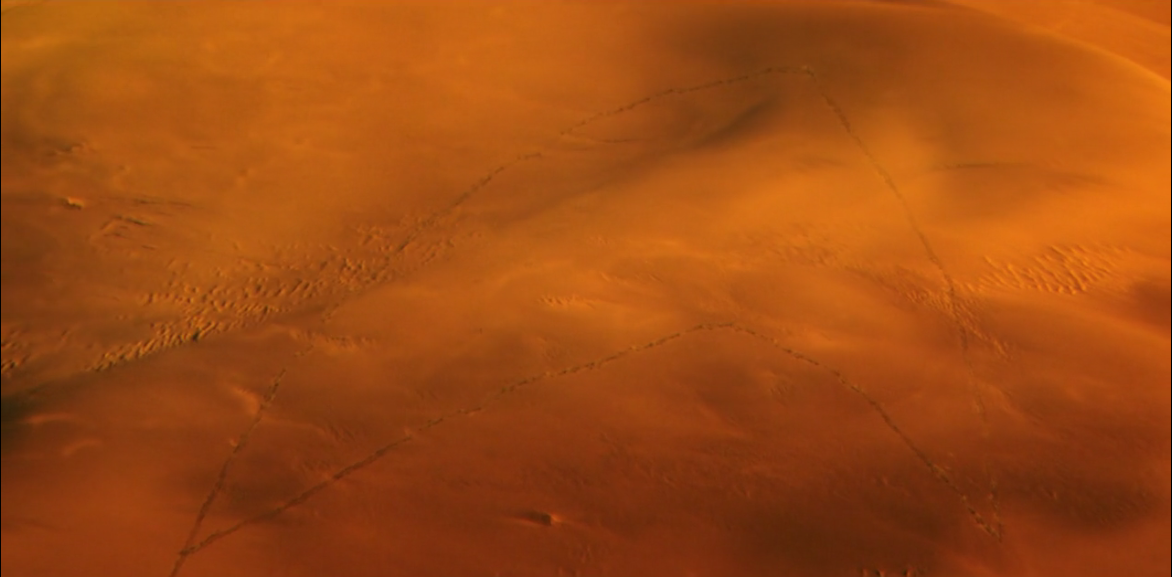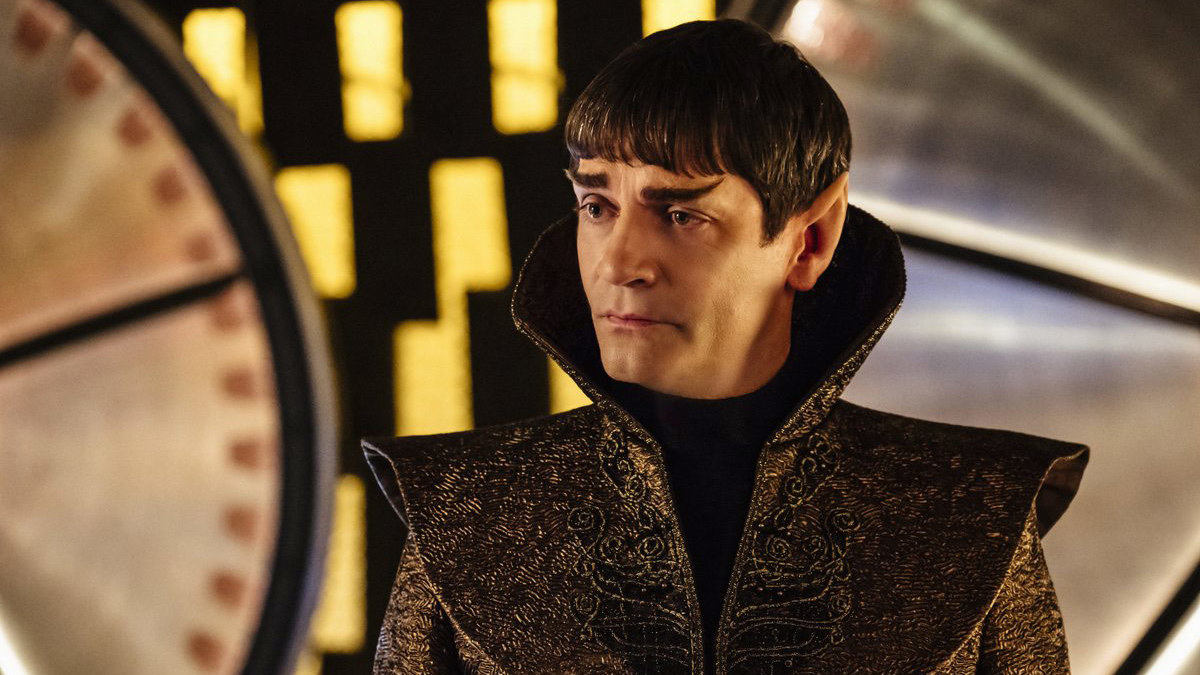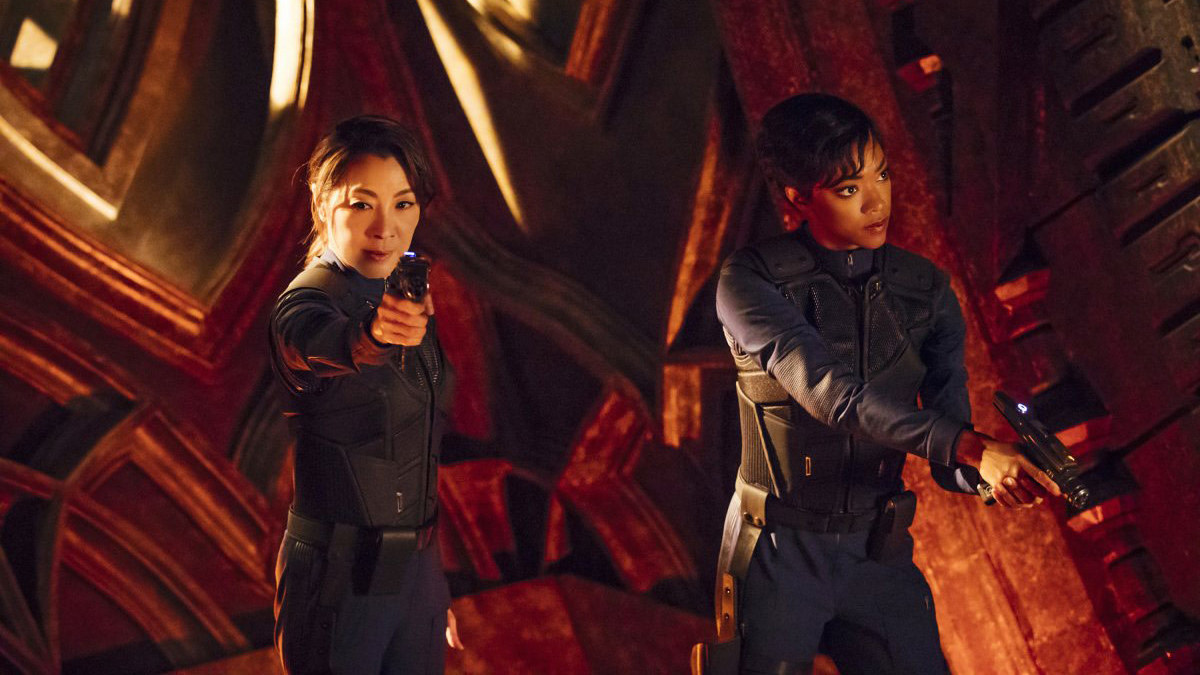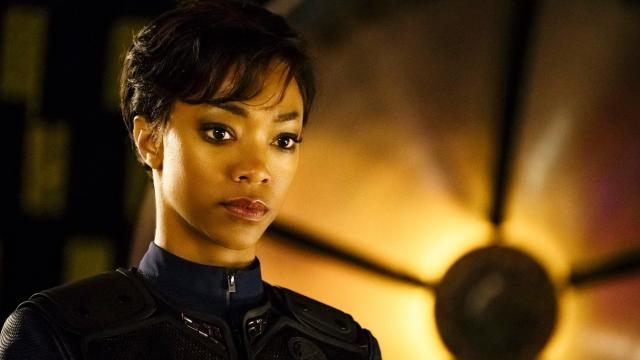The prevailing question about Star Trek: Discovery is “Is it good enough?” Is it good enough to justify all the delays? Is it good enough to get over the fact that CBS embargoed all reviews until now? Is it good enough to justify paying $US5.99 ($8) ($US9.99 ($13) without commercials) a month? And, based on the first two episodes, the answer appears to be “Maybe?”
All images: CBS
Last night’s two-episode premiere — the first on CBS the network, the second on the CBS All-Access online streaming service — served as a prologue to the show proper. By itself, the premiere is fine. It’s slickly made, that’s for sure. There are canon issues, but they aren’t crippling. Style-wise, it’s very much in the mode of J.J. Abrams’ Star Trek, and like those movies, the premiere focuses on CG splendor and action scenes — but with new characters we haven’t gotten to know yet.
Based on all the news and reports on the show we’ve received over the last year, we know the rest of the series is significantly different from last night’s prologue. Which makes it impossible to judge the show by its pilot, because we know so much is going to change. But we can say this: To be a good Trek series, it will need to give us more than we got last night.

The first episode was “The Vulcan Hello,” which opened with Commander Michael Burnham and Captain Phillippa Georgiou (Michelle Yeoh, who is excellent, even though you know from the moment she is introduced that she is not long for this world) in a desert on a mission of mercy. They’re there to open up a well to save a species who needs it. They’re also there so that we can see that Georgiou is a mentor to Burnham and that they have been serving together for seven years, and that Georgiou thinks Burnham is ready for her own command. Oh also, when they lose touch with the USS Shenzhou, Georgiou has them walk around until they make the Starfleet logo in the sand so the ship can spot it from space and beam them up.

Did…did she leave behind instructions that were, like, “In the event you can’t contact us, use visual sensors to find the giant Starfleet symbol I’ll have us make?”
The Shenzhou is called to investigate a damaged relay on the edges of Federation space. There, they find something in space that’s impossible to scan so Burnham — who has a penchant for impulsive ideas which seem to fly in the face of the idea that she’s been raised by Vulcans — flies toward it in nothing but a spacesuit. It’s an ancient vessel of some kind, and when Burnham lands on it, she discovers its Klingon — because an armoured Klingon appears on the vessel’s surface to kill her. Instead, she accidentally kills him, gets herself knocked unconscious and dosed with radiation, and when she wakes up in Sickbay has to convince the rest of the crew that those really are Klingons out there, which the rest of the crew doubts because the Federation hasn’t seen them in a hundred years.
Burnham succeeds, and Georgiou contacts Starfleet, where an admiral tells them to hold their position and wait for backup. When Burnham demands action and is slapped down by the admiral, she places a call to her mentor, Spock’s Vulcan father Sarek (James Frain), who has a casual chat with his old ward where he a) reminds her/us that Klingons killed her parents and b) tells her that the Vulcans were able to hammer out a peace with the Klingons years ago by, basically, adopting a policy of “always shoot first” until the Klingons respected them enough to come to the table. Sarek doesn’t exactly tell her he approves of that action, which is good since — if I may briefly complain about canon — Sarek’s pacifism has, in general, been said to be the source of his distaste for the militarised world of Starfleet. More importantly, it was the reason (at least the outward reason) he and Spock became estranged when the latter joined Starfleet. He was against it for actual ethical reasons.
If this show is going to posit that Sarek developed a distaste for it because of how it treated Burnham, I’m going to remind everyone that this is only a decade before Spock shows up as the first officer of the Enterprise. Spock should be in the Academy — or even out of it, given Vulcan ageing — by now. So, Sarek turned on Starfleet sometime during Burnham’s stay? That’s fast.

Also, during this talk, the Sarek hologram…has a seat on the desk? How? Did he sit down wherever he was and the hologram somehow….know and put him on the desk?
Anyway, Burham tells the Shenzhou to load up everything they have got and fire it at the Klingon ship so that they can get the same respect the Vulcans did. This is not a good plan. When Georgiou says no, Burnham asks to speak with her in the ready room (a lot of this first episode is people going in and out of ready rooms). An extremely emotional Burnham nerve-pinches Georgiou and tries to take command of the ship with a lie. This is an even worse plan. Georgiou quickly recovers and then, at phaser point, makes Burnham stand down. Meanwhile, over at the vessel T’Kuvma (Chris Obi) talks about Klingon strength and purity and a prophecy. He wants to unite the Klingons, and in order to bring all 24 great Klingon houses to one place, he activates the vessel, which is actually a giant beacon that draws dozens of Klingon ships to his location
Episode one was shown on CBS, ending with the showdown on the Shenzhou bridge. No doubt, CBS hoped people would flock to CBS All Access to sign up and see the second part of what was effectively a two-hour premiere, “Battle the Binary Stars.” When it begins, Burnham is tossed in the brig, a bunch of Starfleet ships have shown up to even the odds, and T’Kuvma makes his pitch about re-unifying the Empire to the major Klingon houses, which of course it involves demonizing the Federation for “mixing” races.
This is heavy-handed, but it’s also fine, because this is Star Trek. Heavy-handedness is the order of the day. It’s mostly a bitch and half because of all the work the franchise has done over the years with the Klingons to revert them from being this one-dimensional. Certainly the Klingons of this era are a proud warrior race and enemies of the Federation, but T’Kuvma’s talk of houses and Klingon beliefs isn’t adding anything new. Hopefully later episodes will explore them in more interesting ways.
Anyway, when the Starfleet ships arrive, the Klingons fire on the Shenzhou; in a very cool effect, part of the ship next to Burnham’s cell is destroyed, exposing her to space — only the jail’s forcefield keeps her from being sucked into the void. After a big old space battle between the Federation and the Klingons, the USS Europa, with an admiral on board, asks for a ceasefire. T’Kuvma grants it, and then rams a cloaked ship right into the Europa because believing in a ceasefire is for suckers. (Also, I guess “honorable warrior race” Klingons aren’t a thing yet.)
Burnham logics her way through to the computer letting her out of the brig, runs to the bridge, and tells Georgiou that they now can’t kill T’Kuvma since they’d just make a martyr. During a distraction that involves Klingon space coffins and bombs, and then the two of them beam into the vessel to grab him. Of course, T’Kuvma kills Georgiou (played by special guest star Michelle Yeoh), at which point Burnham decides not to capture him but shoots him instead, creating the martyr she warned about just a little while ago. Because she’s so emotional about her commanding officer being killed.
And then Burnham is sentenced to life in prison for all the “assaulting a superior officer” and “mutiny” shit from episode one. Also, now there’s a war on. Oops.

Discovery is basically fine. It looks pretty. There’s a big old space battle the likes of which the old TV shows only rarely got to do. Burnham being drummed out of Starfleet and a prisoner is an interesting way to go with a main character. Of course, Voyager had Tom Paris filling that role, but he wasn’t the lead.
The major problem with Burnham is that everyone, especially Georgiou, talks about how Vulcan Burnham is when, in fact, she’s the most emotionally compromised person ever. Georgiou laments her inability to get through the Vulcan shell around Burnham even though we saw Burnham beg to save her life. Not the ship’s, but Georgiou’s life in particular. The only thing remotely “Vulcan” about Burnham is her ability to do calculations in her head and a hotline to Sarek.
A lesser problem is that the chemistry is off. Burnham and Shenzhou’s science officer, Saru (Doug Jones). The two supposedly have a longstanding inability to agree on anything, but it seems like they just met each other a couple of days ago. However, once the show gets into the swing of things, this will hopefully improve; also, when the real cast — i.e. the rest of the crew of the Discovery — come aboard, hopefully their chemistry will fare better, too.
But that’s the thing. It’s extremely hard to make any judgment about this show based on these two episodes. Only Burnham and Saru are will move to the Discovery. Previous Star Treks have always been well served by a strong ensemble., but I have no idea if Discovery has an ensemble with potential yet. Burnham’s fine, but her very questionable behaviour make her a questionable lead; it all depends on whether she’ll grow from the bad decisions she made in the premiere, or if she’s going to always emotionally act first, and ask logical questions later.
The war with the Klingons is also… fine. There’s a fight, the villains are known to audiences, it all depends on what Discovery can make of it from this point on. But the inclusion of the Klingons is a prime example of why prequels can be a problem. We know where the Klingon Empire is headed, and it’s much more interesting than where they have been. Discovery has regressed them, and so far, not in an interesting way. But there’s more show to come.
Honestly, the best scene in the whole premiere was when an injured bridge crew member accidentally stumbled on Burnham in the brig and asked what they were doing. Because they’re Starfleet, they’re meant to be explorers. The dichotomy between Starfleet’s stated exploration and discovery mission and it’s quasi-military set-up has never been adequately explored in Trek. This is a thread that’s absolutely thread worth follownig. Unravelling this future where war and fighting is a last resort, but the most advanced scientific fleet also asks that you obey orders, protocol, and the chain of command is interesting. Hell, Burnham is supposed to be a scientist herself, but we see her advocating blowing shit up and fighting hand-to-hand with Klingons. If Discovery really wants to delve deep into the Star Trek universe, this is the place to start.
Mostly, what Discovery reminded me of was Enterprise. Part of it is that this, too, is a prequel series banking on fond memories. Both also have the terrible blue uniforms instead of colour, an encounter with Klingons to kick everything off, and, so far, a dearth of likable characters. But with 11 more episodes in its first season, Discovery definitely has room for improvement.
I have many mixed feelings about Discovery, based on what we’ve finally seen, both logically and emotionally. But for now, it’s probably best to wait and see where it boldly goes next, once the show starts for real.
